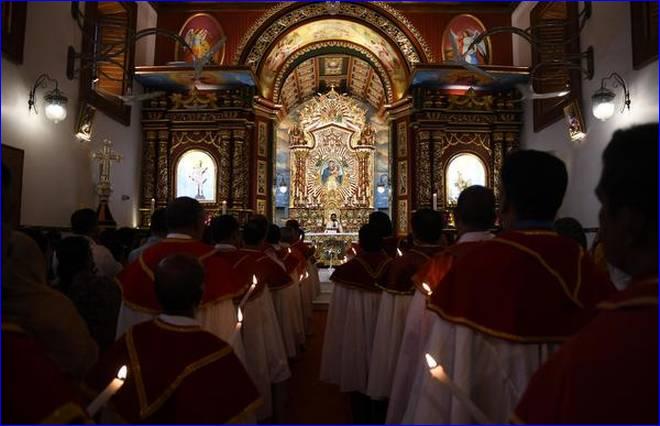


 H Vibhu)
H Vibhu)
Though no longer considered a spoken language in Kerala, the liturgical significance of Syriac finds it echoing in ecclesiastical corridors, as many churches continue to conduct Mass in the ancient language on certain festive days. However, in schools and colleges in the State, Syriac has been enjoying a sustained favour among many students who opt for it as a second-language elective as part of the course.
"If you look at under-graduate courses across Kerala, perhaps about 500 students are learning Syriac," says Father Geevarghese Valiya Changaveettil, vice-principal of Mar Ivanios College in Thiruvananthapuram and Syriac instructor. He says the classical language is offered as a language elective for all colleges affiliated to Mar Ivanios College.
Although Syriac has been introduced as a language elective at higher secondary level as well, Father Changaveettil says many students study the language for the first time only in college.
"The syllabus, which includes grammar, poetry and prose, is fine-tuned for beginners and we start from the basics for the two-year module," says Father Changaveettil, adding that over 25 students currently learn Syriac under him. Though Mar Ivanios College, an autonomous institute, offers the elective in West Syriac, colleges under Mahatma Gandhi (MG) University follow East Syriac.
Father Sujay John, guest lecturer, Syriac Department, St Berchman's College, Changanassery, says Mass in Syriac is more common in churches in Kottayam district. As an elective, introducing Syriac as an optional in some higher secondary schools has helped students gain some familiarisation with the language. "Some students who show an interest in ancient languages often take it up in college. Also, some find it easier to learn Semitic languages, perhaps due to certain similarities the languages share with Malayalam," he says. Currently, about 85 students from several departments have opted for Syriac, he adds.
However, Father John points out a drawback. "Since almost none of the students takes Syriac studies forward after graduation, quite often we see the language dying out from their minds. Only a minuscule percentage of students go for further studies in Syriac," he says, adding that MG University offers post-graduation in Syriac. However, several catechism classes include learning of Syriac, which is more commonly taught in some seminaries in Kerala.
For some students, choosing Syriac in college is an opportunity to continue learning the language even after Plus Two. Like Megha James, a student of English Literature at Mar Ivanios College, who was initiated into the classical language in her catechism classes and later studied it as a second language. "My family follows liturgy mainly in Suriyani and hence I have always had an interest in Syriac. Also, I found the curriculum easy," she says.
As a liturgical language, Father Changaveettil says Syriac evokes a fervour of the old days. "Many prayers were originally written in Syriac or an associated language. However, for offering a Mass in it, good translations are important. Pure Syriac is rarely used in churches now here," he explains.
Father Jacob Thekeparambil, director of St Ephrem Ecumenical Research Institute (SEERI), a centre for Syriac studies, Kottayam, says that historically, Syriac has had big influence on Malayalam. Suriyani Malayalam, or Karshoni, formed as a hybrid dialect. "Many are unaware that there are a lot of Syriac words in today's Malayalam diction. For instance, common expressions of negation in Dravidian linguistic heritage -- like illa or alla -- are derivatives of Syriac words," he says. Malakha (angel) is another.
"Malayalam is open to the rhythm and syllabic rules and intonations of Syriac. So translation of many Syriac melodies into Malayalam largely retain its original musicality," adds Father Thekeparambil.

or register to post a comment.